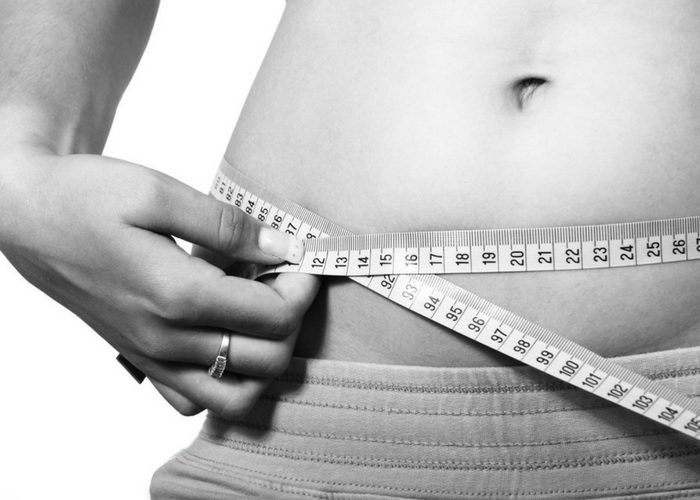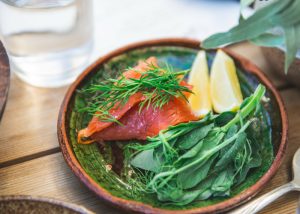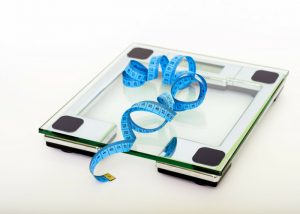Things were going so well. You made a promise – if only to yourself – to lose weight and you really went for it. After increasing your daily exercise and starting a serious healthy eating plan, things began to happen. In just a matter of just weeks, you lost a significant amount of weight and it felt amazing. You were really on a roll, but it didn’t last. You don’t know how or why, but you’ve suddenly hit a weight loss plateau.
If this scenario sounds all-too-familiar, know that you are not alone and that it’s completely normal. As your body changes and adjusts to the long-term effects of losing weight, your results may slow down or stall out. But don’t worry! Here’s what you need to know about weight loss plateaus and what you should do to get over them.
What Is a Weight Loss Plateau?

Watching what you eat and taking regular exercise leads to ongoing weight loss, right? Well, not always. When you first start adapting your lifestyle, you may find that your pound-shedding journey is a quick one, but it’s likely to start to slow down over time. Hitting a weight loss plateau is not uncommon but it can be frustrating.
You’re still leading a healthy, active lifestyle. However, these changes which yielded great results when you first began no longer have the same effect. It may feel as though all your best-laid plans and efforts are nothing more than a mere waste of time.
The battle might seem never-ending and you may even consider giving up. Don’t do it. There are some simple reasons behind this sudden halt and some effective weight loss plateau solutions you can try too.
What Causes Weight Loss Plateaus?

Before we get into how you can solve this frustrating problem, you need to understand what causes these plateaus.
When you first start dieting and exercising, chances are that you’ll see a significant drop in your weight and you might set your expectations high, believing that this pattern will continue. Unfortunately, that’s not always what happens. Here are some of the reasons for a sudden slow down or halt in your results.
Increased hunger
Do you find yourself feeling hungrier after shedding some pounds? You’re not imagining it. Research from the American Physiological Society (APS) found that the hormones which control your feelings both of hunger and fullness increase dramatically after losing weight.[1] However, the sensation of being hungry overrides that of being satisfied.
You may not realize it but you could be eating more thanks to your newfound hunger levels. This unexpected side effect of slimming down could lead to a weight loss plateau. Being mindful of this issue is the first step to getting over it.
Failing to stick to your diet
Sticking rigidly to a diet plan can be particularly tough. If your ‘cheat days’ are getting more and more frequent, they are likely the reason your weight loss journey has hit a wall. Early weight loss plateaus at around the six-month mark are often caused by a lack of strictness in the diet, according to research published in the US National Library of Medicine.[2]
When you first start your diet plan, you’re likely to be strict and adhere closely to a healthy diet. However, as time goes on, it could be easier and easier to slip up. Continuously assessing the food you’re eating and making sure you’re not straying is the way forward.
Metabolic changes in your body
Losing weight causes your metabolism to change. Research published in the Journal of the International Society of Sports suggests that these bodily adaptations could be what causes weight loss plateaus in some cases.[3]
While there’s not much you can do about these changes, you can adapt your lifestyle accordingly. It’s all about acknowledging the shifts in your metabolism and working to combat them. Making small, sustainable changes could be one of the best ways to break a weight loss plateau.
How Long Does a Weight Loss Plateau Last?

If you’re experiencing an unexpected weight loss plateau, there’s likely only one burning question on your mind – how long will it last? The truth of the matter is that everybody is different, which means that it’s hard to pinpoint how long this slowdown will last.
To give you a general idea here, most women find that this sudden stall can last for a matter of weeks. However, you should note that your body could take longer to start shedding pounds if you don’t take action quickly.
The power is in your hands. Learning how to break a weight loss plateau is the first step. There are plenty of small lifestyle and dietary changes you can make that will make a huge difference to your journey. When you start taking control, you should see a change.
How to Break a Weight Loss Plateau
Rather than letting this annoying and frustrating problem hold you back, it’s time to do something about it. With that in mind, here are 12 science-backed strategies you can try to break a weight loss plateau. Learn them and use them to keep on track toward a happier, healthier future.
1. Take a break from dieting

It might sound counterintuitive but if you’ve found that you’ve reached a stalling point in your diet, taking a break might not be a bad idea. This brief respite might be just what your body needs to kick-start your system into shedding those pounds again.
In fact, one study from the University of Tasmania found that taking a short, two-week break during a weight loss program had effective results.[4] Not only did participants lose more weight than the control group during the trial but they also gained less weight after it had finished. The results suggest that breaking your diet could mean better and more sustainable weight loss in the future.
2. Create small, achievable goals

Here’s a quick question: how much weight do you ideally want to lose? You might already have a number in mind. However, setting your goals too high could be seriously detrimental to your overall weight loss. Rather than choosing long-term goals, it may be more effective to opt for smaller ‘mini-goals’ that can be achieved if not easily, then quickly.
Research from the University of Alabama at Birmingham found that opting for incremental goals – i.e. small ones which make up one larger target – could be a smart way to lose weight.[5] The reason is that when we set long-term goals, we can easily get distracted along the way and fail to meet them.
On the other hand, short-term targets are more quickly attainable, which means that we have the continuous satisfaction of reaching them. Researchers noted that these small wins could be just the thing to keep us on track.
3. Keep a daily food diary

A failure to stick to your diet can lead to a weight loss plateau or, worse still, weight gain. So what can you do about it? Well, a strikingly simple solution is to keep a daily food diary. This tip will effectively force you to monitor what you consume each and every day. That means you won’t accidentally stray from your current healthy eating plan.
Not convinced? There’s a whole body of research to back-up this theory. For example, a study by Kaiser Permanente found that merely keeping a log of the food you eat can double the amount of weight you lose.[6] Grab an empty journal and start writing!
4. Get the rest you need

Are you getting your 40 winks each night? If you lie awake tossing and turning, it could affect more than just how you feel the next day. In fact, there’s a rather surprising link between the quality of sleep you get at night and how much weight you lose or gain.
‘Looking for a way to lose weight? You’d better make sure you catch those ZZZ’s! It could be way more important than you think!’
Failing to get enough sleep can significantly lower the morning resting metabolic rate in healthy adults, according to recent research.[7] This phenomenon could mean that it’s easier for people who lack sleep to gain weight at a rapid pace.
Should you worry about this issue, you may need to make some lifestyle changes. Avoiding technology before you hit the hay and attempting to stick to a regular routine could help you boost the quality of sleep you get and help you break that weight loss plateau.
5. Fuel up on a high-energy breakfast

You may have heard that it’s the most important meal of the day, but did you know that what you eat for breakfast can impact your weight loss program? Research from The Endocrine Society suggests that a meal plan which includes a high-energy breakfast could be the answer to ongoing losing weight and successfully avoiding obesity.
Healthy, energy-packed breakfasts include those that are rich in protein. For example, you may wish to start your day with a vitamin and protein-packed meal of boiled eggs and spinach. Alternately, you could feast on yogurt and grapefruit or orange, both of which are high in glucose. Start experimenting with tasty breakfast recipes today!
6. Boost your activity levels

It might sound obvious, but if your activity levels have waned since you first started to lose weight, you need to do something about it. Many people are under the impression that they are more active than they actually are. Being sedentary for long periods during the day could contribute to problems when it comes to weight loss.
So, how can you boost your metabolism? Fidgeting might be the answer. One study found that people’s general metabolic rates increased by a massive 54% when they made small, frequent movements when lying down.[8]
Even more surprising was the fact that standing up and fidgeting increased this rate by 94%. So, the next time you catch yourself being perfectly still, get moving. It could be an effective weight loss plateau breaker.
7. Tailor your diet to suit your tastes

Having trouble sticking to your diet plan? Eating well should be a pleasure, not a chore. However, if your current eating and weight loss program consists of food you hardly find appealing, that’s a real problem. If you want to change your body shape, you have to change your relationship with food. That starts with your diet.
According to information from the US National Library of Medicine, one of the best ways to ensure that you adhere to your diet is to tailor it to your food preferences.[9] The key here is finding healthy dietary staples that you enjoy eating.
Give it a go! It may be a case of trial and error when you first start out. Try experimenting with new and different ingredients on a regular basis. When you find a nutritionally balanced meal that you simply can’t wait to enjoy, it’s a recipe for weight loss success.
8. Boost your protein intake

Can you feel those hunger pangs again? The reason you’re feeling so peckish may not actually have anything to do with your appetite. If you’re not getting enough protein in your daily diet, it may lead to excessive hunger and, of course, overeating.
‘Boosting the levels of protein in your diet could mean that you’re fuller for longer!’
There is a theory from the Society for Endocrinology that a digested protein known as Phenylalanine triggers hormones that make you feel less hungry.[10] Making an effort to eat more protein-rich food could help you ward off hunger.
Adding more protein to your diet couldn’t be easier. You may already know that you can get it from lean meats, but you should also consider alternative sources. For example, leafy greens, tofu, and whole grains are packed full of healthy proteins.
9. Include legumes in your diet

Sustainable weight loss isn’t just about cutting back on your calorie-count. If you’re aiming for some serious weight loss, you should also pay close attention to the ingredients you use. Introducing more legumes including beans, lentils, and peas to your eating plan could be an easy way to shed some extra pounds.
Research published in the American Journal of Clinical Nutrition suggests that eating around ¾ cup of these foods each day could lead to big changes in your weight loss program.[11] The theory is that this small change can lead to weight loss of over half a pound. Nice!
10. Feast on vegetables

Do you “eat your greens” like your momma told you? If not, maybe you should! Increasing the amount of vegetables on your plate could be a positive move when it comes to reaching your fitness goals, and it could be a solution to getting over a weight loss plateau. Research suggests that diets which include large volumes of these ingredients often lead to the highest levels of weight loss.[12]
The great thing about vegetables is that they are low in fat and high in vitamins. Should you fancy a large feast, you can’t go wrong by guzzling down a load of these things. When cooking up some hearty vegetables, avoid frying in favor of steaming or boiling for the healthiest results.
11. Carry a water bottle at all times

Hydration is the foundation of any healthy diet. Few people drink as much water as they should on a day-to-day basis. That’s a major problem. When you lack hydration, it can lead to a medley of health problems. Furthermore, as the feeling of hunger is strikingly close to that of thirst, failing to drink water could cause you to eat more food than you need.
Why not start carrying a water bottle with you wherever you go? Doing so will increase your hydration levels in no time. Drinking 500ml of water around 30 minutes before eating a meal could help to promote a healthy and natural way to lose weight, according to a study from the University of Birmingham.[13] So drink up!
12. Don’t rely too heavily on the scale

You get up, stretch, head to the bathroom, and jump on the scale. Sound familiar? When you’re in the midst of trying to shift a few pounds, you might find that weighing yourself is part of your daily routine. While tracking your journey is important, paying too much attention to what the scale says could be a problem.
The readings you get from a scale could vary dramatically depending on a wide range of things. From the time of day you weigh yourself to how much water you’re carrying, there’s no end to the reasons you may appear heavier or lighter than you are.
For instance, research shows hormone changes in young women have a massive impact on how much fluid the body retains.[14] That means that, at certain times, you could seem heavier than usual even though you’ve been following a strict diet and exercise plan. Don’t let it worry you!

Conclusion
Make no mistake – hitting a weight loss plateau can be discouraging at the best of times. But you mustn’t let it mark the end of your healthy lifestyle. There could be a wide and varied selection of reasons why your results have briefly stalled. That doesn’t matter. What does is what you do next. Follow our advice, try out these weight loss plateau breakers, and you should find it’s easy to get back on track!
Regular exercise is important for breaking a weight loss plateau. If you’re struggling, keep reading to learn 10 tips for exercise motivation.
References
- [1] https://www.physiology.org/doi/10.1152/ajpendo.00322.2017
- [2] https://www.ncbi.nlm.nih.gov/pmc/articles/PMC4135489/
- [3] https://jissn.biomedcentral.com/articles/10.1186/1550-2783-11-7#Sec7
- [4] https://www.nature.com/articles/ijo2017206
- [5] https://www.sciencedaily.com/releases/2013/01/130117132931.htm
- [6] https://www.sciencedaily.com/releases/2008/07/080708080738.htm
- [7] https://www.ncbi.nlm.nih.gov/pubmed/26538305
- [8] https://www.ncbi.nlm.nih.gov/pubmed/11101470
- [9] https://www.ncbi.nlm.nih.gov/pmc/articles/PMC5618052/
- [10] https://www.endocrinology.org/press/press-releases/researchers-may-have-found-how-high-protein-diets-cause-weight-loss/
- [11] https://academic.oup.com/ajcn/article/103/5/1213/4569588
- [12] https://www.ncbi.nlm.nih.gov/pubmed/17556681
- [13] https://www.birmingham.ac.uk/news/latest/2015/08/Abottleofwaterbeforeeachmeal260815.aspx
- [14] https://www.ncbi.nlm.nih.gov/pubmed/18580296








